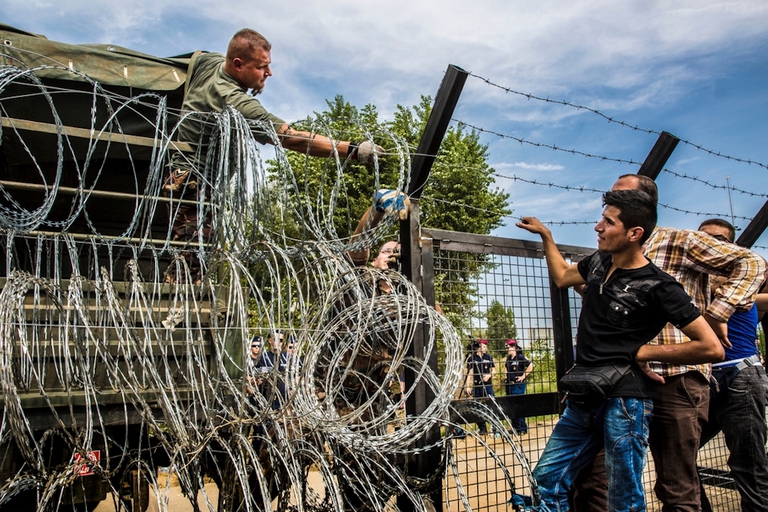
The Louise Michel is the humanitarian rescue ship saving lives in the Mediterranean. Financed by the artist Banksy, it has found a safe port in Sicily.
Un rapporto di Medici senza frontiere punta il dito contro le politiche con le quali l’Ue ha risposto alla crisi dei migranti: “Un catastrofico fallimento”.
The policies implemented by the European Union in 2015 to respond to the humanitarian needs of refugees, asylum seekers and migrants tuned out to be a “catastrophic failure”. The accusation comes from Médecins Sans Frontièrs (MSF), in a report (titled Obstacle Course to Europe) released on 19 January, which draws a – grim – overview of the medical-humanitarian impact of decisions made by Europe.
“Not only did the European Union and European governments collectively fail to address the crisis, but their focus on policies of deterrence along with their chaotic response to the humanitarian needs of those who flee actively worsened the conditions of thousands of vulnerable men, women and children,” said Brice de le Vingne, Director of Operations for MSF.
“Never before has MSF had so many projects in Europe. Never before has MSF decided to mobilise three search and rescue ships at sea to save lives,” added Federica Zamatto, Deputy operations coordinator for MSF. “Never before has it been more urgent for European governments to step up to their international obligations and assist those whose lives are at risk”.
Between 1 January and 15 December 2015 the NGO had to triple its actions, with over 100,000 medical and mental consultations carried out in Italy, Greece, and Balkans, whilst rescuing 23,747 people at sea. This was made possible thanks to the activism of 535 humanitarian operators.
The report especially blames the “obstacles the EU and European governments placed in the way of more than one million people, most of them fleeing war and persecution from not providing any alternative to a deadly sea crossing, to erecting razor wire fences and continuously changing administrative and registration procedures to committing acts of violence at sea and at land borders; and providing completely inadequate reception conditions in Italy and Greece, Europe has done an atrocious job”.
“We have witnessed a lot of pregnant women and children queuing for several days in the mud, soaking wet in the pouring rain without any protection, some of them only wearing a t-shirt. People can’t stand up anymore because their feet are swollen after being wet for several days. Police don’t allow refugees to leave the queue to have access to healthcare. This is completely inhumane,” said MSF project coordinator in Lesbos, Greece.
“It may be a new year but we know that people will continue to risk their lives and no restrictive policy will stop them from seeking a better future for themselves and their families,” said Aurelie Ponthieu, MSF’s Humanitarian Advisor on Displacement. “We continue to call for a safe passage and urge Europe to stop playing with people’s lives and dignity”.
Siamo anche su WhatsApp. Segui il canale ufficiale LifeGate per restare aggiornata, aggiornato sulle ultime notizie e sulle nostre attività.
![]()
Quest'opera è distribuita con Licenza Creative Commons Attribuzione - Non commerciale - Non opere derivate 4.0 Internazionale.
The Louise Michel is the humanitarian rescue ship saving lives in the Mediterranean. Financed by the artist Banksy, it has found a safe port in Sicily.
Venezuelan refugees are vulnerable to the worsening outbreak in South America: while coronavirus doesn’t discriminate, it does affect some people more than others.
In the midst of India’s coronavirus lockdown, two dozen people lost their lives in a desperate bid to return home: migrant labourers forced to leave the cities where they worked once starvation began knocking at their doors.
Behrouz Boochani returned to being a free man during the course of this interview. The Kurdish writer was imprisoned by the Australian government in Papua New Guinea for six years.
The Global Compact for Safe, Orderly and Regular Migration was signed by 164 nations in Marrakech. This is what the non-binding agreement that encourages international cooperation stipulates.
The winners of the World Press Photo 2019 tell the stories of migrants in the Americas. From the iconic image of a girl crying on the border between Mexico and the United States to the thousands of people walking from Honduras towards a better life.
The Semìno project is a journey of discovery through different countries’ food habits, offering migrants employment opportunities and allowing us to enjoy the properties of vegetables from all over the world.
Travelling across the new route used by migrants to cross the Balkans and reach Trieste in Italy, a reportage that documents the social, economic and political changes of the countries along the way.
The countries hosting the most refugees aren’t the wealthy, Western ones. An overview by NGO Action Against Hunger reminds us that refugees and internally displaced people are far from being safe.








